Are you a Quiet Speculation member?
If not, now is a perfect time to join up! Our powerful tools, breaking-news analysis, and exclusive Discord channel will make sure you stay up to date and ahead of the curve.
Yes, you read that title correctly. For better or worse, this series is coming to its end for the year. The only remaining PPTQ for PT Rivals of Ixalan is Sealed Deck, so this is the end. Until the Modern grind resumes next year, anyway.
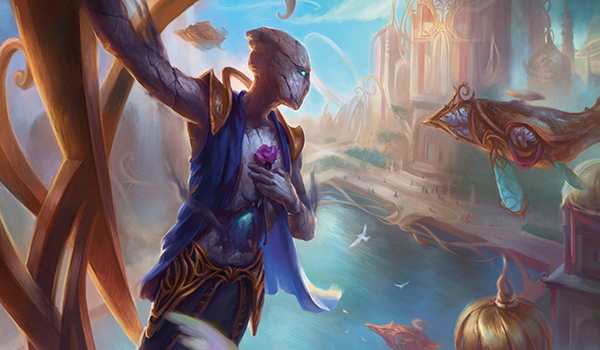
I really wasn't sure what to expect this week. The PPTQs have been wildly different, both in terms of attendance and metagames. My performance has also swung wildly between almost getting there and just bombing out. It's been mostly highs and lows, with the only middling result coming in week three. Sometimes that has been because of my deck choices. Sometimes I just wasn't there mentally. I've had my share of excellent plays and embarrassing mistakes, good and bad fortune. I just didn't quite get enough to actually make it. That's disappointing, but I've been at this long enough to know that's just how it goes.
Before we go on, I want to draw attention to the SCG Modern Open in Louisville last weekend. The Top 32 is interesting, most prominently Tom Ross being Tom Ross and getting in with 8-Rack, though I especially want to highlight the UW Merfolk list at 29. It's really nice to see others doing well with the decklist I've championed for so long. Self-congratulation aside, the finals were closed out by what Star City is calling Jeskai Control, but they're definitely midrange decks. In fact, the lists are very nearly identical. Both are built to maximize Snapcaster Mage and Geist of Saint Traft with lots of burn and Cryptic Command; they're far more aggressive than true control. I didn't see the finals, but just looking at the lists, I'm guessing that Harlan's Spell Snares gave him the edge to win. Snapcaster is critical to these decks and having a cheap answer is great.
The Deck
While we're still thinking about Louisville, my Spirits list is exactly what you want against those Jeskai lists. Cavern of Souls, Aether Vial, hexproof creatures, and Chalice of the Void shut down their interaction, forcing them to race. You can definitely lose if you can't answer Geist and burn, but that's fairly rare. I've hit the deck many times and it's never been close.
I played basically the same Spirits list for this week as previously, with just a small tweak to the sideboard. The maindeck has consistently proven that it does exactly what it's built to do and lock down interactive decks while having game against the midrange creature decks. Creature swarms continue to be problematic, but solving that would destroy the deck's identity. I'm fine with this and look to improve things with the sideboard.
UW Spirits, by David Ernenwein (PPTQ Deck)
Testing had shown Meddling Mage to be largely unnecessary, so I cut him. I was told that Burn and Dredge would be quite popular so I added more cards for those matchups. In retrospect, I should have just played more Cages.
The Tournament
This PPTQ was held in south-central Denver. I had never been to this particular store and knew nothing about the player base. You tend to know who plays where if you grind as much as I do, but while I knew the shop was fairly venerable and reasonably popular, nobody ever talked about it as "their" store. I hate going in unprepared, so I asked around about the local metagame during the week. I was told that Burn, Dredge, and non-creature combo were popular in that area, so I prepared accordingly. This PPTQ was very large for this season at 50 players for six rounds, many of which I had not seen before at any event.
To be fair to my informants, there was a fair amount of those decks present. There were 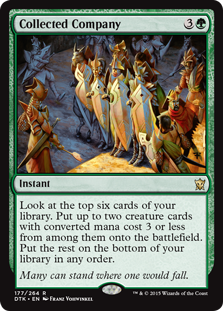 just a lot more Collected Company decks. They'd completely disappeared over the past month, yet here they were, out in force. Even some players who I knew always play other decks were on Company. Did I just miss the memo or was this the strategy all along? Company, and value creature decks in general, are terrible matchups for Spirits. Chalice is too slow, their clock is faster, and they can just combo me out. My day went quite poorly, with only two wins against midrange Abzan and Jund. I played all six rounds because traffic was horrible and lost to Counters Company, Kiki-Evolution, Grixis Delver, and Bant Company. The Delver match was particularly frustrating as that's normally a good matchup thanks to Chalice but I drew the wrong cards at the wrong time and my opponent drew very well. Variance.
just a lot more Collected Company decks. They'd completely disappeared over the past month, yet here they were, out in force. Even some players who I knew always play other decks were on Company. Did I just miss the memo or was this the strategy all along? Company, and value creature decks in general, are terrible matchups for Spirits. Chalice is too slow, their clock is faster, and they can just combo me out. My day went quite poorly, with only two wins against midrange Abzan and Jund. I played all six rounds because traffic was horrible and lost to Counters Company, Kiki-Evolution, Grixis Delver, and Bant Company. The Delver match was particularly frustrating as that's normally a good matchup thanks to Chalice but I drew the wrong cards at the wrong time and my opponent drew very well. Variance.
A highlight was Ninja of the Deep Hours. He was phenomenal in both my wins and even in my losses generated quite a bit of value. Lightning Bolt is still out of vogue, though making a comeback, which means many players have to jump through hoops to remove him. In one game against Abzan, Ninja hit turn two and never left the board because my opponent couldn't trigger revolt for Fatal Push. Since adopting this deck, Ninja has averaged two card draws and a favorable trade each time he's played. If you're picking up this deck, I know he looks weird, but you should not cut Ninja of the Deep Hours.
Overall
So with the season winding down, it's time to look back at my performance and look for areas to improve. That was, after all, one of my goals with this series. I've been on the grind for a long time now, and I'm pleased to say that I have been improving. It's hard to quantify exactly how much, since my first PTQ way back in Mirrodin block, and especially since the old PTQs and current PPTQs work differently, but it is working. There was a time that I bombed every single Constructed event that I attended. The only PTQs I actually did well in, until I actually won the last Modern PTQ playing Merfolk, were Limited. My constant work is paying off and I'm getting closer more often. I'm just looking for that last little push to actually get there again.
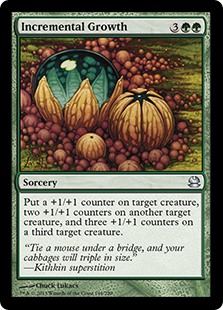 The other factor for me is that I'm known now. For years, I was underestimated because I wasn't particularly successful or well known. That has changed. During the first year of PPTQs I had a lot more Top 8s than this year, but I was also very well-positioned playing Merfolk in fields of Splinter Twin, and I surprised a lot of players. They didn't know what to expect and I was able to use that information advantage well. I don't get that boost anymore. I think that this shift away from my most familiar deck and players knowing what to expect from me is partially to blame for my only making two Top 8s this year.
The other factor for me is that I'm known now. For years, I was underestimated because I wasn't particularly successful or well known. That has changed. During the first year of PPTQs I had a lot more Top 8s than this year, but I was also very well-positioned playing Merfolk in fields of Splinter Twin, and I surprised a lot of players. They didn't know what to expect and I was able to use that information advantage well. I don't get that boost anymore. I think that this shift away from my most familiar deck and players knowing what to expect from me is partially to blame for my only making two Top 8s this year.
The weird part for me is how swingy my results have been. With the exception of week three I've either bombed out or been second. I believe that this is a function of the decks I've played, and for reasons I'm going to detail, I'm not unhappy with this.
Deck Choice
Overall I'm happy with my deck choices, though they didn't always work out. This last week I should have been playing Merfolk, as it has a much better matchup against Company decks thanks to its faster, more consistent clock. But I only know that in retrospect. Based on the information I had going into each tournament, I made the best decision I could on which deck to play. There were certainly decks that were better positioned than what I played (I think that week two was actually Storm's week to win) but I didn't have those decks with me. For what I do have put together and practiced, I picked correctly based on my information.
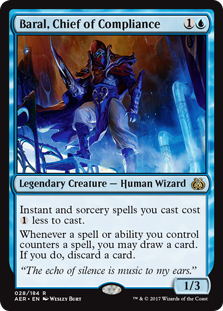 The other thing is that I ended up playing a very swingy deck. This was huge change for me because I normally play decks with even matchups and often build my deck to be even more average. You never know what you're going to hit at a Modern tournament, and I like to hedge.
The other thing is that I ended up playing a very swingy deck. This was huge change for me because I normally play decks with even matchups and often build my deck to be even more average. You never know what you're going to hit at a Modern tournament, and I like to hedge.
This year, I purposefully played a deck that was extreme. I've been advised by a number of actual Pro Tour staple players and some semi-pros that you're more likely to spike a tournament this way. Even BBD during his run to World Champion said that you just need to get lucky and hit the right meta to get there. When I hit favorable metagames and matchups, I went right to the top, losing to decks I was very unlikely to beat under any circumstance. When I was off, I had no chance. I knew this going in, and while I wish I had gotten there, if my finals opponents had been playing different decks I may have won easily. I've never said that about any other deck I've piloted. Merfolk is good, but the games are often close, especially these days.
Areas to Improve
I've kept notes about mistakes and things I missed for years now, and my post-match lists are getting longer. Partially this is because I'm getting more meticulous, but it's mostly because I'm noticing things I've never noticed before. I don't make big mistakes now, when my brain is functioning anyway. Instead, it's a lot of little sequencing errors or misevaluations. Shocking on the wrong turn so that I represent the wrong spell; which creature I run into removal; when to hold excess lands or just play them; playing around too many spells that I know my opponent has in hand. The little mistakes may only be worth a few fractions of a percent, but they add up. I'm noticing that there are a lot of almost undetectable miscues that don't hurt on their own, but when combined with others will turn the game around. I need to get better at the micro-side of my play and managing the game.
I am proud of how far I've come this season, though. Over the past two months I've gotten much better at divining my opponent's deck and cards in their hands and adjusting my play accordingly. Playing a more complicated deck was challenging and for the most part I rose to the challenge and developed my skills noticeably. This bodes well for my future grinding.
About Spirits
I cannot say that UW Spirits is a good deck in an open metagame. It has a lot of very bad matchups that you struggle against even if you heavily sideboard against them. However, it is excellent at doing what it was designed to do: beat Fatal Push. Between all the three-drops and Rattlechains, you're just not vulnerable to Push. You can avoid most other removal as well thanks to hexproof and Selfless Spirit. 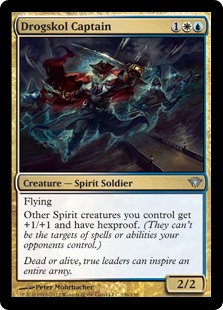 Combine this fact with Chalice and you have a deck that just stomps on Grixis and Jeskai lists. If your meta is mostly Death's Shadow or control, then I heartily recommend this deck.
Combine this fact with Chalice and you have a deck that just stomps on Grixis and Jeskai lists. If your meta is mostly Death's Shadow or control, then I heartily recommend this deck.
However, it is susceptible to being proactively ground out. You only get value from your creatures when they're dodging your opponent's spells, and against a Company deck, you will often fall behind. You don't have much board interaction either, so anything that can go big quickly, like Champion of the Parish, can be very problematic. It's very much a deck that you have to dodge and get lucky with, but when you do it is rewarding.
...Until Next Time
Hopefully some of you actually did get there this year. If so, I wish you luck for the RPTQ. I have one more try in a few weeks, so hopefully I get the good Sealed Pool. Next week, if things come together and I can get the last matches completed, there will be the data from the Preordain testing. See you then!




I am always surprised by people who believe you can effectively metagame a tournament. Even at a small lgs the turnout and decks will change every week because joe and bob were out of town, and jerry is trying a new deck. Make it a competitive pptq event where more “outsiders” will attend and the meta becomes completely and utterly unpredictable even for a small store with the same ten regular players. Furthermore, just because there are 3 company players in the room does not mean you will face them anyways.
Trying to predict your matchups strikes me as a masturbatory effort in futility. I get that you’re going to build a 75 that is better or worse vs various decks, but how you pick which ones you want to shore up might as well be a coin flip as this pseudo-science crystal balling.
You can’t effectively metagame at big events. Even the best metagame power rankings are only approximations. However, at small events where you are well informed it can work out. It did work very well in previous weeks, as I noted in those articles. The problem this week was that I didn’t have the same level of information on local players as previous and was punished.
I’ve said many times that metagaming is high risk high reward and it depends on how well informed about the actual metagame you are. When you do get it right you’ll cruise to victory as I did Weeks Four and Six. When you don’t, you bomb out just like Weeks One and Seven. Normally I don’t bother gaming the system, but this year I tried something different.
I do think it’s useful to try to predict what you’ll be facing, but I’d relegate that more to the side than to the main.
For example, 3 company players
To align yourself to be a bit better vs them makes you a bit worse vs the 27 other deck.
That’s the control dilemma though and why I stopped bringing control in modern.
It’s frustrating and rarely lines up
Normally that’s the strategy I follow. This year was different, I was trying to be game the system with my maindeck. It nearly worked, but I may have had a better win percentage overall with the more normal strategy. It was a judgement call.